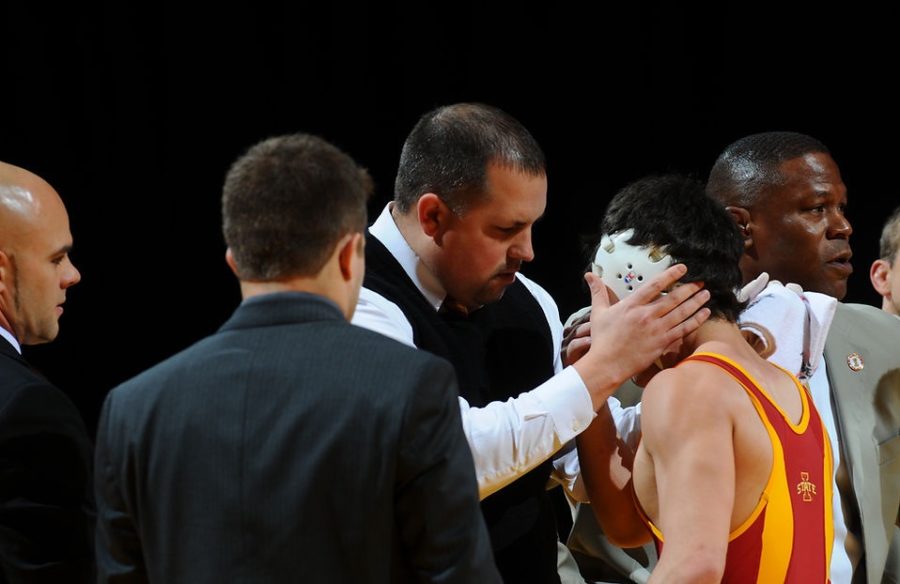ISU wrestling: Athletic training beyond the body
Donning a cardinal and gold singlet, a wrestler steps into the spotlight feeling calm, cool, collected and primed to successfully dominate the competition.
This is what the spectators observe. What they do not see is the group of individuals who led this wrestler – and his teammates – to take the mat. They are unaware of the role played by people like Tim Weesner, the athletic trainer for Iowa State University’s wrestling team when it comes to keeping the entire squad feeling strong.
“Obviously, it’s [Weesner’s] job to keep us healthy, but you can tell he likes doing it,” Jason Kraisser, a senior studying software engineering, said. “He loves to see our progress, especially after you’ve had some kind of injury… If you walk in [the training room] and you’re banged up…he’s never going to doubt you.”
Weesner has always been interested in the science of sport, but his commitment to assisting athletes officially began when he explored his profession at a summer camp. He then went on to earn his bachelor’s and master’s degrees from Iowa State. After serving a brief stint at Arizona State University, Weesner returned to Ames and has been working full-time for the Cyclones since 2008.
Weesner constantly strives to be accessible to his wrestlers in both the physical and mental capacities of the sport.
“He’s there all the time for us,” said Ben Monroe, a senior studying economics. “At our beck and call, basically.”
Wrestling calls upon the strength of each individual’s performance for the entire team’s benefit. Given that, Weesner works alongside the coaching staff to ensure each athlete is prepared in every way possible.
“Our ultimate goal is obviously for them to be successful in class, in athletics and everything else,” Weesner said. “But to [also] make sure that everything we’re dealing with is healed and healthy and get them in a good spot to be mentally healthy.”
As someone who provides treatment for some of his athletes two or even three times every day, Weesner places emphasis on the relationships he cultivates with each wrestler. He believes a majority of the work he completes moves beyond physical rehabilitation or injury prevention and leads him to build everyone’s confidence.
This year, Weesner is getting acquainted with the 20 freshmen on the team so he can support them in the best manner.
“I’m just trying to get to learn them and kind of know what are their backgrounds, what are they coming from,” Weesner said. “That’s the part that I enjoy the most, and figuring them out, building that relationship and that connection with them, so I can help them when it is hard.”
These intentions are evident to the athletes Weesner works with. Monroe suffered a torn lateral collateral ligament (LCL) last year. While recovering from this injury, he took note of Weesner’s efforts.
“He tells us that we’re strong and our bodies are capable of doing certain things,” Monroe said. “He keeps me confident in that I know that if I get hurt, I’m going to be on the mat as fast as humanly possible.”
In addition to caring for the wrestling team, Weesner is an associate director of athletic training at Iowa State. These responsibilities include supervising staff members and supplying general administrative support for the entire university’s athletic training program.
Weesner also teaches a class for students in their first year of graduate school. Here, he focuses on educating individuals about the science behind different injuries. As the semester progresses, Weesner mentors students while they engage in hands-on experiences in the training room.
“I tell all my young students that it’s a tremendous honor and opportunity that we have to work with people at this age,” Weesner said. “They’re exploring the world and their life and…we get to be a part of that. You have to take responsibility that is due as a leader of young people.”
Your donation will support the student journalists of the Iowa State Daily. Your contribution will allow us to purchase equipment, send our student journalists to conferences and off-set their cost of living so they can continue to do best-in-the-nation work at the Iowa State Daily.















